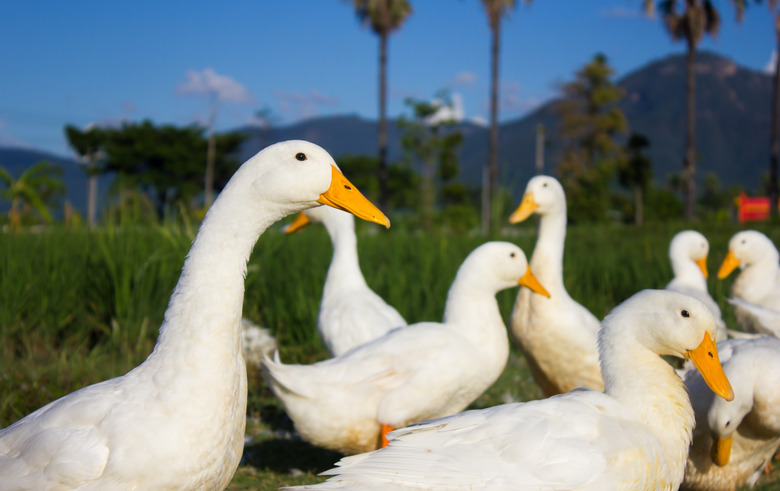How To Tell If You Have A Sick Duck
Ducks are hardy birds and fun to watch. There are many different varieties of ducks, such as the Pekin or Muscovy ducks. Ducks are becoming popular for the urban farmer because there are so many great backyard duck breeds. Some varieties of ducks are even endangered. New Zealand has endangered blue ducks that are so popular in that country that they are featured on the country's 10-pound note. Another great thing about ducks is that according to Countryside Network, people who have an allergy to chicken eggs can often eat duck eggs, which makes them a good option for the home farmer.
General health in ducks
General health in ducks
The coop manufacturer Omlet says that ducks are generally hardy and remain in good health if they have their basic needs met. Ducks need a diet that is right for them (not a diet for chickens or other birds, as each bird type has its own nutritional needs). They need plenty of clean drinking water, water to splash around in, and secure, clean housing. When ducks eat or splash around in unclean water, that is a common cause of health problems with ducks.
Duck respiratory problems
Duck respiratory problems
Omlet says ducks can sneeze, and they can develop bronchitis with symptoms that are similar to what humans might experience with a respiratory infection. Duck respiratory problems can lead to a duck having a gasping sound or actual sneezes with a discharge from the nose. A drop in egg production also accompanies this infection.
Common duck diseases
Common duck diseases
To identify if you have a sick duck, first learn to identify normal duck behavior. While ducks will spend a lot of time in or on water, they need a dry place to retreat to where they can groom themselves safely. Their waterproofing and grooming keep their feathers in good shape and keeps their bodies warm. Healthy ducks will dabble in water, quack occasionally, have clean feathers, and will move around readily.
Countryside Network lists several common duck diseases. Bumblefoot is a name for a staphylococcus infection that affects the feet. This can be caused by a cut on the feet, stepping on something sharp like a splinter, or landing on their feet hard. Bumblefoot looks like a black scab and causes ducks to limp.
Duck eyes are prone to something called Sticky Eye, which is an infection caused by debris, a scratch, or rough mating. A duck eye infection leads to redness, continually keeping their eyes closed, or bubbling of liquid out of the duck eye.
Wet feather in ducks
Wet feather in ducks
Ducks have an oil gland that they use when they clean their feathers. They spread the oil on their feathers to keep their feathers waterproof. When they have unclean water or not enough water, Countryside Network says this gland can stop working. Without this waterproofing, ducks cannot stay dry and then can essentially catch a cold. If your duck seems to have lost her waterproofing or seems continually chilled, clean her gently with Dawn detergent and give her plenty of clean water while her feathers recover.
What will ducks eat?
What will ducks eat?
One thing that works against duck health is that they will eat almost anything. This can lead to them ingesting substances that are potentially toxic. Ducks are also attracted to shiny things, which can mean they might ingest a screw, a piece of jewelry, or a piece of wire. Eating something like this can result in an impacted crop, or poisoning. An impacted crop means they ate something that is stuck in their throat. For an impacted crop, gently massage the area to try to loosen whatever is stuck, and give your duck olive oil and plenty of water for lubricating the movement of the impacted object.
Poisoning in ducks
Poisoning in ducks
Botulism is found in stagnant water. Since ducks love to splash around, if their water is not clean they could be exposed to something toxic. Mold or other toxic exposure can lead to symptoms of a sick duck such as lethargy, diarrhea, decreased appetite, loss of weight, seizures, dehydration, vomiting, drooping wings, unsteadiness on their feet, or difficulty walking.
The Cornell University College of Veterinary Medicine says that many duck diseases can be managed by merely giving ducks proper housing, ventilation, and nutrition. This minimizes stress on the ducks, which keeps their immune systems stronger. Ducks need protection from extreme weather and predators in a clean, dry area. They need access to clean water. While Cornell says water for swimming is not essential, it can be beneficial in areas where temperatures are high. They need a diet that meets their daily nutritional needs, and they need sunlight, particularly if your ducks are layers.
